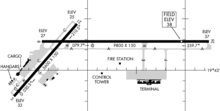Hilo International Airport
|
Hilo International Airport Kahua Mokulele Kauʻāina o Hilo |
|||||||||||||||
|---|---|---|---|---|---|---|---|---|---|---|---|---|---|---|---|

1990 view of ITO with Mauna Kea in the background
|
|||||||||||||||
| Summary | |||||||||||||||
| Airport type | Public | ||||||||||||||
| Operator | Hawaiʻi State Department of Transportation | ||||||||||||||
| Location | Hilo, Hawaii | ||||||||||||||
| Elevation AMSL | 38 ft / 12 m | ||||||||||||||
| Coordinates | 19°43′13″N 155°02′54″W / 19.72028°N 155.04833°WCoordinates: 19°43′13″N 155°02′54″W / 19.72028°N 155.04833°W | ||||||||||||||
| Website | hawaii.gov/ito | ||||||||||||||
| Maps | |||||||||||||||
 Airport diagram |
|||||||||||||||
| Location within Hawaii | |||||||||||||||
| Runways | |||||||||||||||
|
|||||||||||||||
| Statistics (2010) | |||||||||||||||
|
|||||||||||||||
|
Source: Hawaiʻi State Department of Transportation
|
|||||||||||||||
| Passengers | 1,279,342 |
|---|---|
| Aircraft operations | 78,663 |
| Cargo (tons) | 25,245 |
Hilo International Airport (IATA: ITO, ICAO: PHTO, FAA LID: ITO), formerly General Lyman Field, is owned and operated by the Hawaiʻi state Department of Transportation. Located in Hilo, Hawaiʻi County, the airport encompasses 1,391 acres (563 ha) and is one of two major airports on Hawaiʻi Island and one of five major airports in the state. Hilo International Airport serves most of East Hawaiʻi, including the districts of Hilo and Puna, as well as portions of the districts of Hāmākua and Kaʻū. Most flights to the airport are from Honolulu International Airport. These flights are predominantly operated by Hawaiian Airlines and Aloha Air Cargo.
It is included in the Federal Aviation Administration (FAA) National Plan of Integrated Airport Systems for 2017–2021, in which it is categorized as a small-hub primary commercial service facility.
In 1927 the Territory of Hawaii legislature passed Act 257, authorizing the expenditure of $25,000 for the construction of a landing strip in Hilo. The site was known as Keaukaha, on land belonging to the Hawaiian Homes Commission. Inmates from a nearby prison camp cleared the area of brush and rocks. The new facility was dedicated on February 11, 1928, by Major Clarence M. Young, then Secretary of Aeronautics of the U.S. Department of Commerce.
...
Wikipedia

